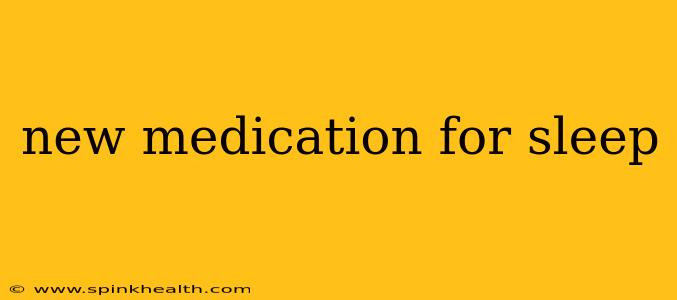The Search for Slumber: Navigating the New World of Sleep Medications
The relentless hum of modern life often leaves us craving the elusive tranquility of a full night's sleep. For many, this pursuit leads to the exploration of new sleep medications, a landscape constantly evolving with innovative approaches to tackling insomnia and sleep disorders. But finding the right medication can feel like navigating a maze. This isn't just about counting sheep; it's about reclaiming your well-being. Let's unravel the complexities together.
My name is Dr. Evelyn Reed, and for over 15 years, I've specialized in sleep medicine. I've witnessed firsthand the transformative power of proper sleep and the struggles individuals face in achieving it. This article aims to provide a clear, informative, and compassionate overview of the emerging trends in sleep medication, dispelling myths and highlighting the importance of personalized approaches.
What are the newest sleep medications available?
This is a constantly shifting landscape. Pharmaceutical companies are continually researching and developing new compounds. While I cannot provide specific brand names or endorse any particular medication (as that requires a personalized consultation with a physician), I can discuss the types of medications currently being explored and used:
-
Orexin Receptor Antagonists: These medications target orexin, a neurotransmitter that promotes wakefulness. By blocking orexin, they can help induce and maintain sleep. They are often considered a newer class of sleep aids.
-
Non-benzodiazepine hypnotics: This is a broad category that includes medications that help promote sleep without the addictive properties often associated with older benzodiazepine-based drugs. These are generally considered safer for long-term use, but always under the guidance of a doctor.
-
Melatonin Receptor Agonists: These medications target the melatonin receptors in your brain, mimicking the effects of melatonin, the hormone that regulates your sleep-wake cycle. They can be particularly helpful in addressing circadian rhythm disorders.
-
Combination Therapies: Some newer approaches focus on combining different mechanisms to create a more comprehensive approach to sleep improvement. This might include combining a medication targeting orexin with another that improves the quality of sleep.
What is the safest sleep medication?
There's no single "safest" sleep medication. The best option entirely depends on your individual circumstances, medical history, and the specific sleep disorder you're experiencing. A doctor will assess your complete health profile, consider any potential drug interactions, and discuss potential side effects before recommending any medication. Factors such as age, pre-existing conditions (liver or kidney disease, heart conditions, etc.), and other medications you are taking all play a crucial role.
What are the side effects of new sleep medications?
Side effects vary greatly depending on the medication and the individual. Common side effects might include daytime drowsiness, dizziness, nausea, headache, and changes in mood. Some medications carry a higher risk of certain side effects, and these risks will be thoroughly discussed by your physician. Open communication with your doctor about any side effects you experience is absolutely vital.
How long does it take for new sleep medications to work?
The onset of action also depends on the specific medication and the individual. Some medications may begin to work within 30-60 minutes of ingestion, while others may take longer to build up to their full therapeutic effect. Your doctor will provide specific guidance on the expected timeline for your prescribed medication.
Are there any natural alternatives to sleep medication?
Absolutely! Many natural approaches can support healthy sleep. These include:
- Improved Sleep Hygiene: Establishing a consistent sleep schedule, creating a relaxing bedtime routine, ensuring a dark, quiet, and cool sleep environment.
- Cognitive Behavioral Therapy for Insomnia (CBT-I): This therapeutic approach targets the underlying thoughts and behaviors that contribute to insomnia.
- Regular Exercise: Physical activity can significantly improve sleep quality, but avoid intense workouts close to bedtime.
- Dietary Changes: Limiting caffeine and alcohol intake, particularly in the evenings.
Remember, improving your sleep is a journey, not a race. Finding the right approach involves careful consideration of your individual needs and close collaboration with a healthcare professional. If you are struggling with sleep, reach out to your doctor to discuss your options. They can help you determine the best course of action, whether that involves medication, alternative therapies, or a combination of both. Prioritizing your sleep health is an investment in your overall well-being.

